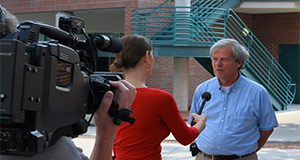Abstract
Becoming informed about an issue does not happen overnight. This publication shares strategies for identifying sources, building habits, and becoming more confident in your knowledge on various current topics. Written by Kathryn A. Stofer, and published by the UF/IFAS Department of Agricultural Education and Communication, September 2024.
References
Abernathy, P. M. (2020). News Deserts and Ghost Newspapers: Will Local News Survive? University of North Carolina at Chapel Hill. https://www.usnewsdeserts.com/reports/news-deserts-and-ghost-newspapers-will-local-news-survive/
Abernathy, P. M., & Stonbely, S. (2023). The state of local news 2023: Addressing digital and journalistic inequalities, promising business models, and dwindling local news outlets. Northwestern University. https://localnewsinitiative.northwestern.edu/projects/state-of-local-news/2023/
Ad Fontes Media. (n.d.). Home. Retrieved August 7, 2023. https://adfontesmedia.com/
AllSides. (2018). Frequently Asked Questions. AllSides. https://www.allsides.com/frequently-asked-questions
Bozdag, E., & van den Hoven, J. (2015). Breaking the filter bubble: Democracy and design. Ethics and Information Technology, 17(4), 249–265. https://doi.org/10.1007/s10676-015-9380-y
Dodgen-Magee, D. (2021). How and Why to Take a Break from the News. Psychology Today: Media. https://www.psychologytoday.com/us/blog/deviced/202101/how-and-why-take-break-the-news
FactCheck.org. (n.d.). Our Mission. Retrieved August 7, 2023. https://www.factcheck.org/about/our-mission/
Frohlich, J., Lindsey, A. B., & Radunovich, H. (2021). Mental Health Effects of Media Exposure Following a Natural Disaster: FCS3360/FY1499, 10/2021. EDIS, 2021(5). https://doi.org/10.32473/edis-fy1499-2021
Helmore, E. (2022). Why CNN is shifting tenor from partisanship news to a political center. The Guardian. https://www.theguardian.com/media/2022/jun/21/cnn-shifts-gears-from-partisanship-news-political-center
Huff, C. (2022). Media overload is hurting our mental health. Here are ways to manage headline stress. American Psychological Association. https://www.apa.org/monitor/2022/11/strain-media-overload
Media Bias/Fact Check. (2023). About. Media Bias/Fact Check. https://mediabiasfactcheck.com/about/
NewsGuard. (n.d.). NewsGuard for Media Literacy. https://www.newsguardtech.com/wp-content/uploads/2023/04/NewsGuard-Library-Handout_2023-2.pdf
Oliphant, B. (2018). The Public, the Political System and American Democracy. Pew Research Center - U.S. Politics & Policy. https://www.pewresearch.org/politics/2018/04/26/the-public-the-political-system-and-american-democracy/
Papacek, J., Smyth, A., Abeels, H., & Betancourt, A. (2020). Climate Change and Florida: Frequently Asked Questions. EDIS, 2020(5). https://doi.org/10.32473/edis-ss682-2020
Pew Research Center. (2023). Black Americans’ Experiences with News. Pew Research Center’s Journalism Project. https://www.pewresearch.org/journalism/2023/09/26/black-americans-experiences-with-news/
Saks, E., & Tyson, A. (2022). Americans report more engagement with science news than in 2017. Pew Research Center. https://www.pewresearch.org/short-reads/2022/11/10/americans-report-more-engagement-with-science-news-than-in-2017/
Shearer, E. (2020). Two-thirds of U.S. adults say they’ve seen their own news sources report facts meant to favor one side. Pew Research Center. https://www.pewresearch.org/short-reads/2020/11/02/two-thirds-of-u-s-adults-say-theyve-seen-their-own-news-sources-report-facts-meant-to-favor-one-side/
Snopes.com. (n.d.). About Us | Snopes.com. Retrieved August 7, 2023. https://www.snopes.com/about/
Strasburger, V. C., Wilson, B. J., & Jordan, A. B. (2009). Children, adolescents, and the media (2nd ed). Sage.
Tomasik, E., & Forman-Katz, N. (n.d.). Fewer than half of Black Americans say the news often covers the issues that are important to them. Pew Research Center. Retrieved April 5, 2024. https://www.pewresearch.org/short-reads/2024/01/23/fewer-than-half-of-black-americans-say-the-news-often-covers-the-issues-that-are-important-to-them/
Whitney, L. (2022). Is That True? 4 Browser Extensions to Help You Spot Fake News. PCMAG. https://www.pcmag.com/how-to/spot-fake-news-online-browser-extensions
Wiard, V. (2019). News Ecology and News Ecosystems. Oxford Research Encyclopedia of Communication. https://doi.org/10.1093/acrefore/9780190228613.013.847

This work is licensed under a Creative Commons Attribution-NonCommercial-NoDerivatives 4.0 International License.
Copyright (c) 2024 UF/IFAS

